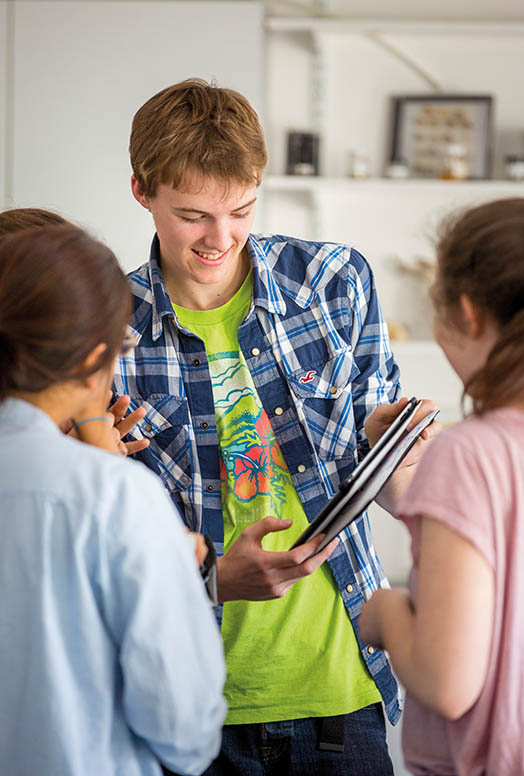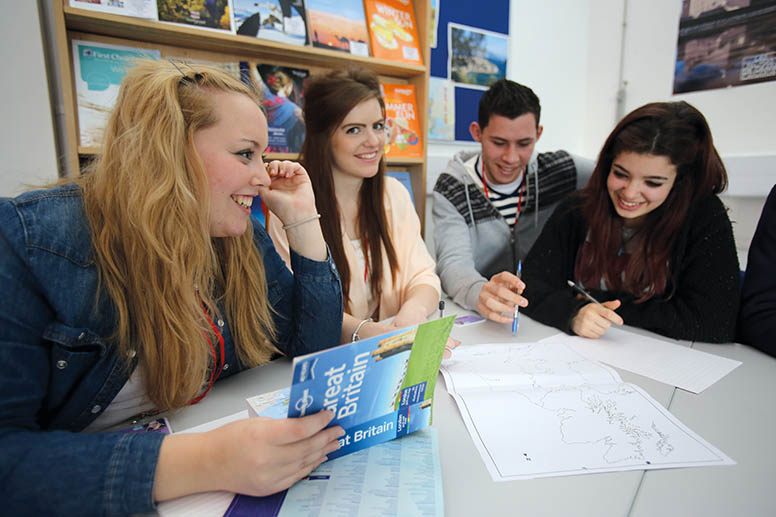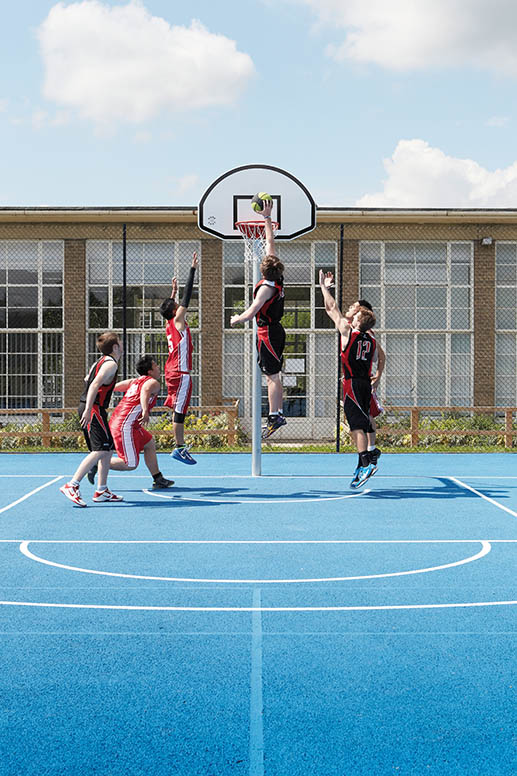(Image credit to Long Road Sixth Form College)
Sixth-form studies used to be regarded as the inevitable gateway to university, but students are increasingly considering alternatives to kick-start their careers.
It used to be such a clear, unambiguous decision. The academically inclined studied for A levels for two years then usually headed off for university. Those keen to draw a line under their schooldays and move into training, earning – or both – tended to leave at 16 for their first experience of the wonderful world of work. Both paths were well-trodden and – in many cases – largely separate.
Now, however, sixth-form studies and the onward destinations that go with them appear as multi-faceted as a disco ball – and potentially just as glittery.
In addition to A levels and their tried-and-trusted subject range – French to further maths, English to economics – there’s a host of additional qualifications and courses out there. Some, like the International Baccalaureate Diploma, are firmly rooted in classical academic teaching, though with the twist of a broader subject range (everyone takes maths, for example); others, such as BTECs, combine classroom study with a far more hands-on, practical dimension.
And just about any course can lead to a multitude of destinations these days. A BTEC might earn you a university place, while a clutch of A levels might be your springboard into an apprenticeship.
For many, the goal will remain higher education. The majority of sixth formers leaving The Leys School this summer are heading to destinations including Oxford, Durham and Birmingham.

(Image credit to The Stephen Perse Foundation Sixth Form College)
Leavers at St Mary’s, too, are embarking on degree courses at high-profile universities – but the school is also seeing former students starting apprenticeships or moving straight into employment. Headmistress Charlotte Avery confirms that sixth formers are going on to a wider range of destinations than ever before.
These include the prestigious EY School Leaver Programme, which lasts five years and leads to a sought-after professional accountancy qualification and a hotel –management traineeship. More unusually, one pupil has taken her first steps towards a career as a professional jockey with a post-GCSE apprenticeship.
So what’s prompted the change in thinking? A lot of the momentum has come from the students themselves, says Pauline Clarke, careers progression and HE advisor at CRC (Cambridge Regional College). “Young people are now looking at their options more carefully. A lot realise that they don’t have to go to university to achieve at a high level in their career, even if they have the grades to do so.”

(Image credit to The Perse)
Today, with increasing numbers of schools and colleges actively preparing their students for a future in which higher education is seen as just one destination among many, life for sixth formers is clearly both more interesting and more complex than it used to be. One website, the self-explanatory ‘Not going to uni’, congratulates visitors on their decision to leave formal education at 18 for having “proved you can think differently.”
University won’t always be the right choice, agrees Hannah Morrish, education community manager at The Student Room. “It can be a stepping stone to a great career. Having said that, though, it won’t be the be-all and end-all for your future.’ She points to full-time work, internships and apprenticeships – all highly successful ways of kick-starting careers.
According to a recent survey by the organisation, 13{b486c5a37ab2d325d17e17d701cb2567b1ecd1814e8ceb33effa2a4f1f171d46} of those who didn’t go on to university said they didn’t have the grades or qualifications they needed to do so. On a more positive note, however, over half who opted not to go into higher education did so because they wanted to “get on and start earning” – a far more positive reason.
“Higher education is seen as just one destination among many.”
Making the right decision is crucial. So before finalising their sixth-form choices, pupils – and their families – should seek enlightenment on planning for life post-16 and beyond well in advance, from the people in the know: sixth-form experts in our area.
Visiting a range of schools and colleges, keeping an open mind about courses and talking to other students can all be invaluable in weighing up the pros and cons of different qualifications and course structures.
Very academic courses with lots of high-pressure exams suit some people down to the ground. Others fare a lot better if there is more emphasis on practical learning or coursework, stresses Pauline Clarke at CRC.
Courses can look amazing, but it’s important to ensure that they’ll take you where you want to go, she says. “The first question I would ask is ‘Where do your students go on to – what are their destinations?’ I’d also want to know if the school or college can help me achieve my aims – will my course get me to university, or to an apprenticeship or into a good job?”
Good guidance is essential in helping pupils opt for a pathway that will lead to the right university and the right course, confirms Stuart Jack, head of The Stephen Perse Foundation Sixth Form College. “Students should receive individual attention to help them make the right choices, for example, whether to follow the A level or IB curriculum,” he says (The Stephen Perse Foundation offers both).

(Image credit to Cambridge Regional College)
Some courses, including medicine and veterinary science, have highly specific requirements. Elsewhere, there is considerable flexibility. “In most cases, a combination of good academic A levels will open the way to a huge range of university courses,” says Ray Mordini, head of sixth form at Friends’ School.
And, as Charlotte Avery explains, it’s also important to find out how you’ll be supported during the crucial sixth-form years. “We believe it’s important to explore all the opportunities that are available, which is why personal and social education, coupled with sound careers advice and access to valuable work experience, play an intrinsic role in our girls’ education.” Inevitably, as in so many other areas of education, there’s also a fair amount of misinformation and confusion out there – so it’s definitely worth scotching any myths at the start.
“Young people are now looking at their options more carefully.”
Most stem from outdated ideas, says Ray Mordini, who emphases the importance of good research. ‘Don’t just go for something because it’s in the “top ten” – it might not guarantee your personal success – and take plenty of informed advice, not just about what’s hot among your friends. The perfect destination for them may not be the right place for you.’ The bottom line is making full use of the expertise available in our area’s schools and colleges, planning ahead so you have a clear idea of where, what and how you would like to study post-16 – and where the courses might lead.
“The sixth form is a bridge from senior school to university, and personalised guidance is key to facilitating a smooth transition,” says Stuart Jack at the Stephen Perse Foundation. Get it right and your final two years at school or college can offer the perfect blend of challenge and enjoyment – with the promise of even better to come after you’ve left.

(Image credit to The Perse)

